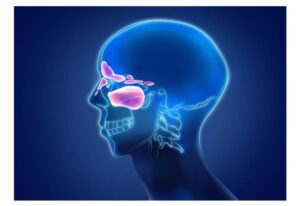Alene Falomo
Sinus pain and pressure is a common condition associated with colds and flus, allergies, and for some chronic sinusitis and sinus infections. Nasal saline irrigation using a Neti pot or nasal rinse kits are a therapy that use a salt and water solution to flush the nasal passages. Ear, nose, and throat surgeons recommend nasal…
Read MoreDo you have symptoms of fatigue, depression, poor concentration, intolerance to cold, weight gain, constipation, muscle cramps, joint pain or vertigo? If so, you may be having issues with an under functioning thyroid gland (hypothyroid). The thyroid gland is a butterfly-shaped organ located in the base of your neck. The thyroid releases hormones that control…
Read MoreAs the workforce shifts from factories to desk jobs, the incidences of low back, neck and shoulder pain are on the rise. Computers are taking a larger role in our work lives and we are forcing our bodies into positions and postures they were not made for. Our bodies were made to move! The incidences…
Read MoreThe truth is that osteoporosis can affect anyone: both men and women. A greater risk is associated in post-menopausal females, those with a family history of osteoporosis, early menopause, infrequent menstrual periods, or absence of a menstrual period. Digestive issues, malabsorption, kidney disease and rheumatoid arthritis are other risk factors. Lifestyle and diet further impact…
Read MoreThere has been increasing debate on whether or not women should do breast self-exams (BSE), however, between 20-40% of all breast cancers are diagnosed based on changes the woman detected herself. Getting to know your “girls” helps women notice if there are any changes out of the ordinary and to monitor any new breast changes…
Read MoreMagnesium is the second most abundant ion in the body. Approximately 60% of all body magnesium is found in the bone, 25% in muscle, and the remainder in soft tissues and fluids including stomach juices. Magnesium deficiency is difficult to assess as blood level measurement of magnesium tends to be a poor indicator of how…
Read MoreWith the warmer weather and the increase in outdoor physical activity, more of us are perspiring in greater quantities. Perspiration is a natural body mechanism that helps keep your body cool. Dehydration from excessive sweating can deplete water-soluble vitamins from the body as well as important electrolytes. Many of us focus solely on replacing electrolytes…
Read MoreAsparagus, comes in three main types green, white and purple. Not only does it taste delicious, but is a wonderful source of a multitude of nutrients for a healthy body and mind. This super food contains many anti-inflammatory and antioxidant nutrients. Asparagus is a good source of glutathione, a powerful antioxidant. Along with the antioxidants…
Read MoreCeliac disease is a genetically inherited autoimmune disease that affects an estimated 1 in every 100-200 people in North America. Health Canada speculates that as many as 300,000 Canadians are affected by celiac, but many remain undiagnosed. Celiac disease is a reaction produced by gluten containing foods. The immune system negatively reacts to gluten, producing…
Read MoreWe all know that exercise is beneficial for health reasons so why aren’t we doing more of it. It is well known that exercise helps to control weight by burning calories. The more intense the activity, the more calories are burned per half hour. Exercise helps to combat heart disease. It helps to increase your…
Read More









